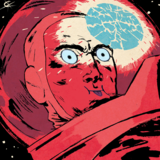Games and Interpretations
By nonused 6 Comments
Sometimes, to make your work hit home, you gotta let the audience fill in the blanks.
At least, that's how I feel about interpretive art. And it seems to me that most game developers aren't too keen on following this concept.
I've been thinking about this quite a bit lately because I've realized how well interpretive elements work for me in other media. Ergo Proxy and FLCL are a couple of the best shows I've ever watched, undoubtedly due to my own interpretation. Bands like Circa Survive and O'Brother sell their music by letting me draw my own conclusions. Countless paintings have remained obscure in order to let their viewers develop their own connections. Why aren't more games trying to follow suit?
Before I go on, however, I want to address a potential issue. Yes, there are games that are hella interpretive (see Braid). But, in what seems to be all cases, these games are indie. It is nice to see that independent groups are interested in leaving interpretation, but it seems that the larger titles are heading in the opposite direction.
The majority of games are very concentrated on delivering an easy-to-swallow plot for the player. Sure, there can be twists and major points scattered throughout, but it seems to be an unwritten rule that the story be relatively easy for the player to follow. On the other end, there's a minority of games that contain convoluted plots, which can be easily mistaken as interpretive. There is a difference, however. A convoluted game wraps itself so deep inside its own rules or fiction that its difficult for the player to follow (see Metal Gear Solid, Kingdom Hearts). A supposed interpretive game would not have its own rules or fiction. It would be up to the player to fill that void. In order to have the player do this, however, games need to embrace something they've been giving awkward glances for a while now. Surrealism.
Yes, we've seen surrealistic elements used in games before, but mostly in art style. It all seems to be window dressing for rather derivative windows. I'd like to point to Ōkami as an example. The player controls a wolf through fantastical lands in a style that is reminiscent of a Japanese watercolor. Sounds pretty crazy until you pull back the curtains and realize you're just saving the world from the ultimate evil. Again. The surrealism needs to bleed into more than just the look of the game in order for it to be interpretive. Think Alice's Adventures in Wonderland. The characters are weird. The setting is weird. Alice's whole situation is weird. Carroll gives the reader a very blurry image of what it is exactly that is being conveyed. All the reader has to do is squint.
And that's what games need to provide in order to be interpretive. Shady context in regard to setting, plot, or even mechanics. I feel that following this idea through will allow players to develop very powerful connections to games through their own interpretations.
How about you? Do you also want to see more interpretive titles? Do you like the way games are now? Something in between?
